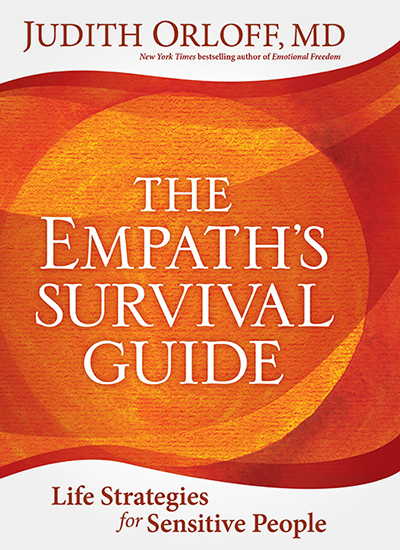
Survival strategies for empaths to embrace their highly sensitive nature without absorbing other people’s negative energy
—
Like many empathic children, I never fit in.Growing up, I felt like an alien on earth waiting to be transported back to my real home in the stars. I was an only child, so I spent a lot of time by myself. I had no one to relate to who could understand my sensitivities. No one seemed to be like me.
I remember sitting in my front yard looking up at the universe and hoping that a spaceship would take me home.
My parents, who were both physicians (I come from a family of twenty-five physicians) told me, “Sweetheart, toughen up; get a thicker skin,” which I didn’t want or even know how to do. I couldn’t go to crowded malls or parties; I’d walk in feeling fine and walk out exhausted, dizzy, anxious, or suffering from some ache or pain I didn’t have before.
What I didn’t know back then was that everyone has a subtle energy field surrounding their body, a subtle radiant light that penetrates and extends beyond it a distance of inches or even feet. These fields communicate information such as emotions and physical well-being or distress. When we are in crowded places, the energy fields of others overlap with ours. I picked up all of these intense sensations, but I had absolutely no idea what they were or how to interpret them. I just felt anxious and tired in crowds. And most of all, I wanted to escape.
What is an empath?
Research shows that high sensitivity affects approximately 20 percent of the population, though the degree of one’s sensitivity can vary. what is the difference between ordinary empathy and being an empath?
Ordinary empathy means our heart goes out to another person when they are going through a difficult period. It also means that we can be happy for others during their times of joy.
As an empath, however, we actually sense other people’s emotions, energy, and physical symptoms in our bodies, without the usual filters that most people have.
Empaths feel things first, then think — which is the opposite of how most people function in our over-intellectualized society. An empath can experience other people’s sorrow and also their joy. We are supersensitive to their tone of voice and body movements. We can hear what they don’t say in words but communicate nonverbally and through silence. There is no membrane that separates us from the world. This makes us very different from other people who have their defenses up almost from the time they were born.
Empaths share some or all the traits of what psychologist Elaine Aron calls ‘Highly Sensitive People’, or HSPs. These traits include a low threshold for stimulation, the need for alone time, sensitivity to light, sound, and smell, plus an aversion to large groups. It also takes highly sensitive people longer to wind down after a busy day because their system’s ability to transition from high stimulation to quiet and calm is slower. Empaths also share a highly sensitive person’s love of nature and quiet environments.
Being a highly sensitive person and an empath are not mutually exclusive: you can be both at the same time. Empaths, however, take the experience of the highly sensitive person further. We can sense subtle energy, which is called shakti or prana in Eastern healing traditions, and we absorb this energy into our own bodies. Highly sensitive people don’t typically do that. This capacity allows us to experience the energies around us in extremely deep ways.
Since everything is made of subtle energy, including emotions and physical sensations, we energetically internalize the feelings, pain, and other physical sensations of others. We often have trouble distinguishing someone else’s discomfort from our own. Also, some empaths have profound spiritual and intuitive experiences, which aren’t usually associated with highly sensitive people. Some empaths are even able to communicate with animals, nature, and their inner guides.
Survival tips for empaths
Below are nine basic strategies for empaths and all people battling low energy from my book, The Empath’s Survival Guide. I practice these strategies in my life and teach them to my patients and workshop participants. You can turn to these techniques if you’re absorbing the stress or symptoms of others and you need ways to release them. Experiment. See which ones work best for you. Use them in situations where you are feeling ill or upset and suspect you’re taking on someone else’s physical or emotional distress.
1. Ask yourself if this symptom or emotion is mine or someone else’s
A tip-off that you’re absorbing someone’s energy is to notice if you experience a sudden change of mood or physical state around that person. Most likely, if you didn’t feel anxious, depressed, exhausted, or sick before, the discomfort is at least partially coming from him or her. If you move away and the discomfort dissipates, it is definitely not yours!
Sometimes, though, the emotion or symptom may be both yours and another person’s. Feelings are catchy, especially if they relate to a hot button issue for you. You are more prone to take on the emotional or physical pain that you haven’t worked out in yourself. The more you heal issues that trigger you, the less likely you’ll be to absorb emotions from others.
2. Breathe and repeat this mantra to counter negative energy
When negativity strikes, immediately focus on your breath for a few minutes. Slowly and deeply, inhale and exhale to expel the uncomfortable energy. Breathing circulates negativity out of your body. Holding your breath or breathing shallowly keeps negativity stuck within you.
As you breathe, I suggest repeating aloud this mantra three times in a tone that conveys you mean what you’re saying: Return to sender, return to sender, return to sender. The power of your voice can command the discomfort out of your body. Your breath is the vehicle that transports it back to the universe.
Also, while saying this mantra, you can specifically breathe toxic energy out of your lumbar spine in your lower back. The spaces between the lumbar vertebrae are conducive to acting as channels for eliminating unhealthy energy. Visualize the discomfort exiting through these spaces in your spine. Declare, I release you as it leaves your body and blends with the giant energy matrix of life.
3. Step away from what’s disturbing you
Move at least twenty feet from the suspected source. See if you feel relief. In a doctor’s office, movie, or other public place, don’t hesitate to change seats. If you’re sitting next to a noisy group in a restaurant, you don’t have to stay there and feel uncomfortable. Feel free to move to a more peaceful table.
Giving yourself permission to move is an act of self-care. Don’t worry about offending strangers. It’s fine to lovingly say NO to certain energies. Empaths often find themselves in overwhelming social situations. If that happens to you, be sure to take breaks to replenish yourself. Then, if you want to return to the gathering you can be in a more serene place.
4. Limit physical contact. Hugs are a choice!
Energy transfers through the eyes and touch. If you’re uncomfortable with someone, limit eye contact and touch, including hugs and hand-holding. Though hugging a loved one in distress often benefits you both, if you are wary of taking on their stress, make the hug short. You can keep sending them love from a distance. You have a choice about the kind of physical contact you participate in.
5. Detox in water
Empaths love water! A quick way to dissolve stress and empathic pains is to immerse yourself in water. Epsom salt baths are divine and also provide magnesium, which is calming. You might want to add a little lavender essential oil to your bath — it is calming after a long day. The perfect empath getaway is soaking in natural mineral springs that purify all that ails you.
6. Set limits and boundaries
There’s no way around it: To survive and thrive, you need to set limits with people. If someone is draining, don’t be a doormat. Control how much time you spend listening to the person. “No,” is a complete sentence!
It’s okay to tell someone, “I’m sorry, I’m not up for going to a party tonight,” or “Let’s discuss this when you’re calmer. I can’t tolerate yelling,” or “I need to meditate and be quiet right now,” or “I can’t talk more than a few minutes unless you want to discuss solutions.” Sometimes changing communication patterns with friends is a retraining process, but being consistent with setting kind but firm limits will protect you from energy vampires.
7. Create alone time to recenter
Empaths need alone time to reconnect with their power. It’s sometimes important to just feel your own energy without anyone else around.
Decreasing external stimulation is a great way to clear negativity, so if you’ve picked up unwanted energy, be sure to take some alone time to center yourself. For a few minutes or more, quiet everything. No noise, bright lights, phone calls, texts, emails, internet, television, or conversations.
8. Spend time in nature and practice ‘Earthing’
Empaths love nature and feel at ease there. Being in a fresh, clean, green environment or around water clears negativity. The Earth emanates healing, so try lying in a meadow and soaking up its energy in your entire body. This feels sublime!
Also try ‘Earthing’ which means going barefoot and feeling the earth’s power through your feet. To shed other people’s energy, feel the grass between your bare toes, walk in the sand or the soil. Sense the nurturing medicine of the earth coming through your feet to ground you — a beautiful experience.
9. Take breaks from being online
Online media that triggers your emotions — such as Facebook groups, Instagram posts, or violent news feeds — can impair your ability to fall sleep. That’s why you need a complete technology-fast once in a while will do wonders for your sense of well-being.
Empaths are sensitive to energy in both the physical and virtual worlds, so make sure you spend time in nature, meditating, or participating in other off-line activities that nurture and restore you. These are proven ways for us empaths to be our own best friend.
You may also enjoy reading 3 Ways To Be Yourself and Live Your Truth, by Suzanne Chang
